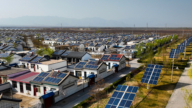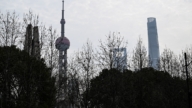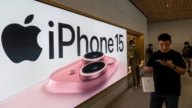【新唐人2014年11月25日訊】中國人民銀行宣佈,11月22號開始,降低人民幣貸款和存款利率,不過中共當局這一罕見舉動,並沒有給外界帶來驚喜。專家認為,中國經濟持續放緩給中共帶來了實際壓力,為了實現好看的經濟增長數據,中共被迫降低利率,不過由於中國的政經體制都已經爛的不可收拾,貸款者把錢拿走後並不會投入實體經濟。而一旦開閘降息,後續造成的通貨膨脹將更加稀釋民眾資產,加速中共滅亡。
中國人民銀行宣佈,從22號開始,下調人民幣貸款和存款基準利率。一年期貸款基準利率下調0.4個百分點,降至5.6%﹔一年期存款基準利率下調0.25個百分點,降至2.75%,同時將存款利率浮動區間的上限,由存款基準利率的1.1倍調整為1.2倍﹔其他各檔次貸款和存款基準利率也相應調整。
美國《華爾街日報》指出,央行的降息舉措,是迫於政治和市場壓力做出的決定,意味著央行承認,此前為提振疲軟經濟採取的零星舉措並沒有奏效。不過,因為市場低迷,降低貸款利率也不能保證借款人有借貸意願。
大陸《新浪財經》評論說,降息對商業銀行是最大的利空,甚至可以說是「致命性」的打擊。
旅美經濟評論家馬傑森:「貸款利息降低比較多,降息的目的是想從刺激實體經濟方向走,而不是把錢從銀行逼出來刺激消費。它一旦第一次降息,那以後降息就可能變為一個常規的調整手段了,它一步一步往下走我們再看,但至少可以看到目前經濟放緩,中共自己也在擔心。」
在採取這一次降息之前,中共央行已經採取了一系列小規模寬鬆措施,不過,《華爾街日報》指出,這些措施並沒有能促進銀行的放貸和企業的借貸意願。
11月6號,央行也承認通過所謂的中長期借貸工具,已經注入7,695億元到中國各銀行,包括9月份注入的5,000億元,和10月份注入的2,695億元。
大陸企業觀察員何軍樵:「這個錢要麼就出逃了,要麼就拿去還債了,基本上沒有拿去再生產,降息基本上沒甚麼大的的用處,對老百姓來說,不是甚麼好事,通貨膨脹馬上就會加劇。撈錢的撈錢,逃跑的逃跑,外流的外流,老百姓最多就弄點工資錢,就看中國老百姓的忍受程度和政府的維穩能力。」
《新浪財經》專欄作家余豐慧認為,降息引發管制利率與市場化融資價格差距拉大,只能導致銀行體系裡的資金流向民間高利貸市場和房地產市場,從而造成企業融資成本更高。同時,由於降息拉大了中國和美國的利差,會導致熱錢流出加劇,使得國內流動性資金更加趨緊,甚至出現熱錢撤離導致的金融風險。
何軍樵:「大家都在往銀行裡撈錢,撈不到錢他就會向社會融資,通過各種手段,無論政府還是民間,銀行都在進行融資,其實很多企業已經資不抵債,大家都在靠這個槓桿在活著,所以現在金融、製造業,包括房地產實際上都是一個龐氏騙局。」
大陸財經評論家牛刀:「大家都干滿了就走了,根本不負責任的,這樣的債務,可以這麼說,本身搞這個的時候就是準備爛債的,他當時借出去這個錢,就不打算讓這些人還的,所以整個商業銀行都會出問題。」
《新浪財經》指出,這次降息的貸款會流向股市、互聯網金融,以及房地產市場。
大陸財經評論家牛刀認為,這次降息完全是為了「救市」,不僅不能刺激經濟,還會導致人民幣長期的大幅貶值。
牛刀:「鈔票印多了以後房地產價格拉的太高,中國共產黨在房地產方面拚命的保住,他們還不想把泡沫搞下來,還要人家繼續去買房。所以共產黨過不了這兩年,絕對過不了,它想怎麼救都沒有用。」
大陸企業觀察員何軍樵也認為,中共的政治體制和經濟體制已經爛的無法救要,任何措施都無法真正解決它所面臨的經濟難題。
採訪編輯/劉惠 後製/舒燦
After Interest Rates are cut, Where will the Money Flow?
The People’s Bank of China announced, from Nov. 22,
the RMB lending and depositing rates decreased,
but this rare move did not surprise the public.
Experts believe that, as China’s economy continually
slows down, it has brought great pressure
upon the Chinese Communist Party (CCP).
In order to achieve a so-called good economic growth data,
the CCP was forced to lower the interest rates.
However, because China’s political and economic system
have become so rotten, it is now impossible to save.
The money lenders will not put the loaned money back
into the real economy.
Once the floodgates to cut interest rates are opened,
subsequent inflation will dilute the assets of the people,
which will accelerate the demise of the CCP.
People’s Bank of China announced, from Nov 22,
the benchmark interest rate of RMB loans and deposits decreased.
One-year benchmark lending rates were cut by 0.4 points
to 5.6 percent; one-year benchmark deposit rates were cut
0.25 points to 2.75 percent,
while the upper limit of floating range deposited interest rates,
was adjusted from the prior 1.1 times of the benchmark, to 1.2 times.
Other benchmark lending and deposit rates
were adjusted accordingly.
United States “Wall Street Journal" said that the decision
of decreasing central bank’s interest rate was forced
due to political and market pressure,
which means Central Bank admits that the prior sporadic initiatives
to boost the weakened economy, did not work.
However, due to the market downturn, lower lending rates
cannot guarantee the borrower can obtain a loan.
China Mainland Sina Financial commented that cutting
the interest rates,
is quite likely to be the worst negative type of news
for commercial banks, even a “fatal" blow.
US-based economic commentator Jason Ma:
“This time the loan interest rate was cut a little more.
The purpose of lowering the interest is to divert
and stimulate the entire economy into the direction
of developing real economy,
instead of forcing to draw out money from the bank to consume.
Once there is a first time cutting of interest rates,
then to cut interest rates might become a regular means
of adjusting the economy.
Let’s see it step by step in the future. But at least it’s seen
that the current economic slowdown makes the CCP worried."
Before cutting the interest rates, the CCP’s Central Bank
has taken a series of small-scale easing measures.
But “Wall Street Journal" believes that these measures
did not promote the lending willingness of banks
and the borrowing willingness of businesses.
On Nov. 6, the Central Bank also acknowledged,
by the so-called long-term lending tools,
a total of 769.5 billion RMB ( US$125 billion) has been injected
into Chinese banks,
including the injection of 500 billion RMB (US$ 81 billion)
in September and 269.5 billion in October.
Mainland enterprises observer Mr He Junqiao:
“This money (lent out from the bank) will either flee away
from China, or be used for paying the debt,
basically the money was not used for
reproduction purposes.
Cutting the interest rates has basically made no difference.
For the ordinary people, cutting the interest rates
is no good thing, because the inflation soon intensifies.
Cutting the interest will allow some people to make lots of money,
some to flee away from China with the money and some
of the money to go outside of China.
The ordinary people just make some money
from their wages at most.
So the final end will depend upon the extent of the people’s
endurance and safeguard stability of the government."
“Sina Financial" columnist Yu Fenghui believes that
cutting the interest rates leads to a much larger gap
between the control of interest rates and the market price,
hence allowing money from the banking system flow into
the non-regulated usury market and real estate market,
resulting in higher financing costs of the enterprises.
At the same time, the interest rate cuts widens
the interest rate gap between China and America,
which leads to an increased outflow of hot money,
tightening domestic liquidity, and even the financial risks
related to the withdrawal of hot money.
He Junqiao: “Everyone is making money from the banks.
If they cannot make money from the banks,
then they raise the money from society by all means.
Whether government owned or private enterprises,
even the banks, they are all financing from society.
In fact, many companies have already become insolvent.
They all sustain themselves by the leverage system.
So now the financial field, manufacturing field and real estate
are all actually a Ponzi scheme."
Mainland Financial critic Niu Dao: “Everyone left once
the term expired.
They are all fundamentally irresponsible for such debts.
So we can speak, when they prepare for the project,
they are ready to engage in this bad debt.
When they lend out the money, they are not going to let the
borrowers repay the debts.
So the entire commercial banks will go awry."
“Sina Financial" indicates that the rate cuts will
drive the loans flowing to the stock exchange market,
Internet banking, and real estate market.
Mainland financial commentator Niu Dao believes that
this rate cut is entirely for the “bailout", however,
this not only cannot stimulate the economy, but also leads
to a sharp depreciation of RMB for the long term.
Niu Dao: “Printing too much banknote leads
to high prices of real estate.
The CCP want desperately to save the property market,
they do not want the bubble bursting,
and even induce the people to continue buying homes.
So the CCP could not sustain the following two years,
absolutely could not sustain over the plight.
Whatever measures they use
for saving the economy, it is no use."
He also believes that the CCP’s political system
and economic system both have been rotten
so indeedt it is impossible to save.
Any measures cannot really solve
the economic problems the CCP are now facing.
Interview & Edit/Liuhui Post-Production/ShuCan




























